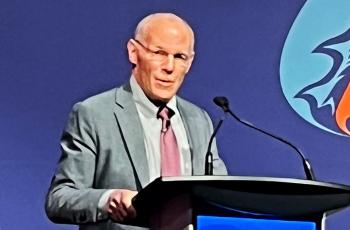Image Caption
Local Journalism Initiative Reporter
Windspeaker.com
Not only is he a leading American economist but Dr. Joe Kalt also co-founded the Harvard Project on Indigenous Governance and Development in 1987.
Kalt was in Toronto recently as a featured speaker at the First Nations Major Projects Coalition (FNMPC) conference.
Kalt spoke at an April 28 session titled Keys To Indigenous Commercial Success.
During his presentation, Kalt provided insights into extensive research from his Boston-based university, which determined reasons behind the successes and the failures of Indigenous businesses worldwide.
Kalt said governments around the globe destroyed communities and cultures and lives through colonization.
“Apologies and reconciliation, they’re nice, but is that all,” said Kalt. “I’m sorry, but you can’t have your resources back? You can’t have the powers to run your own communities back?”
Kalt talked about how Indigenous leaders have partnered with the Harvard project over the years to show that empowering communities through effective governance results in resiliency and prosperity.
“True reconciliation means restoring the self-governing capabilities of Indigenous peoples around the world,” he said. “And we are seeing that here in Canada and in the United States.” Kalt added it’s also the case in places in Mexico and New Zealand.
“In the United States we adopted policies in 1989 – 35 years ago – of self-governance,” he said. “Since 1989, in the United States the average income of the average American citizen grew, after adjusting for inflation, 17 per cent. In Indian Country, as we call it in the States, average income on our reservations has grown 61 per cent since 1989.
“Indigenous Nation economies are growing three-and-a-half times faster than the rest of the United States. And it comes about as a result of flipping the switch and allowing communities to govern themselves and restoring those inherent rights.”
Kalt said similar stories are playing out in Canada. As proof, he cited an analysis worked on by University of British Columbia professors.
They examined dozens of modern treaties that were struck. Some have comprehensive land claims, but others were also coupled with self-governance agreements.
Those that had both experienced 35 per cent more growth in the first 10 years after their treaty agreements were negotiated.
Kalt said the lesson that self-governance matters is obvious.
He emphasized his point by noting what happened in Europe after the Second World War when Germany was split into half and given two forms of government.
“At the end of the experiment in the late 1980s and early 1990s, West Germany was the fifth richest nation in the world,” he said. “And East Germany had to use machine guns to keep people from leaving.”
Kalt said economic development, capital access, natural resources and educated leaders are important.
“But you can have all the resources in the world and still fall flat on your face if you turn the place into chaos,” he said. “Or if you make the place dependent on other peoples’ decisions and not your own.”
Kalt said numerous Indigenous communities in both Canada and the United States asked Harvard researchers to help determine why some communities were soaring while others were floundering. It was determined those that were successful were able to separate business from politics.
“What stood out was this… We had about a sample of about 120 First Nation enterprises, a split about equally,” Kalt said. About half of them had systems of corporate governments in which chief and council basically ran everything, in which the political actors in the community were also the business actors in the community.
“The other half of the 120 had setups where chief and council had set up a separate board of directors, separating the decisions of day-to-day running of the businesses from tribal politics.”
Kalt said research showed those communities whose businesses were run by their tribal politicians had about a 50 per cent chance of survival.
“If you set up the separate board of directors, you didn't always make money,” Kalt said. “You had a five times higher likelihood of staying in the black, of making money, of sustaining the business, not going bankrupt, not being a drain on the community, but being a help to the community.”
This marked the eighth year of the FNMPC conference. About 1,800 delegates attended the event, held at the Sheraton Centre Toronto Hotel.
The FNMPC is a national non-profit organization with a mandate to provide First Nations members with access to tools, advice and knowledge to make business decisions about First Nations involvement and participation in major natural resource and infrastructure projects.
Local Journalism Initiative Reporters are supported by a financial contribution made by the Government of Canada.

